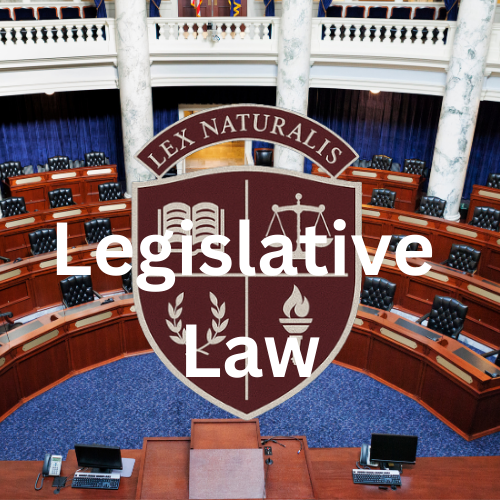The Inner Morality of Legislative Drafting
- Dr. Byron Gillory
- Sep 9
- 4 min read

I. The Necessity of Morality in Law’s Form
Law is not mere command backed by force. It is, in its very essence, an appeal to reason, clothed in authority, and directed toward justice. If statutes are to govern free men and women, they must not only command obedience but merit it by their form and fairness. For when law is obscure, contradictory, or impossible to obey, it ceaseth to be law in any noble sense, and becometh but the tyranny of power.
Lon L. Fuller, in his celebrated work The Morality of Law, did remind the jurists of the twentieth century what Sir William Blackstone and the ancient jurisconsults knew already: that the very structure of law possesseth an inner morality. To draft law rightly is to respect that morality; to neglect it is to betray the very calling of the legislator.
II. Fuller’s Eight Principles
Fuller identified eight ways in which law can fail, thereby ceasing to be law properly so called. These may be recited as principles that constitute the inner morality of law:
Generality — laws must be general in their application, not arbitrary commands aimed at particular persons.
Promulgation — laws must be public, so that those bound may know their obligations.
Prospectivity — laws must look forward, not backward, lest they punish deeds committed before prohibition.
Clarity — laws must be intelligible, lest obedience be impossible.
Consistency — laws must not contradict one another, creating traps for the subject.
Possibility of Compliance — laws must not command the impossible.
Stability — laws must not change so frequently that no man may know them with confidence.
Congruence — the law as written must be faithfully applied by those who administer it.
These are not moralities of end, but of means; they do not dictate what a law should command, but how law must be framed if it is to be law at all.
III. The Application to Legislative Drafting
How do these principles guide the noble craft of Legislative Law?
Generality: The Legislative Counselor must ensure statutes do not serve as weapons of faction, singling out individuals or groups for burdens not borne by others. Special-interest carve-outs, though common, offend the very spirit of law.
Promulgation: Statutes must be drafted in a form accessible to the people—codified, published, and plain. Secret law is tyranny.
Prospectivity: The draftsman must resist the temptation of retroactive legislation. Law must guide future conduct, not punish past acts that were lawful when performed.
Clarity: Words must be chosen with precision. Ambiguity is not merely a stylistic defect; it is a moral one, for it ensnares citizens in obligations they cannot discern.
Consistency: The Legislative Jurist must guard against contradiction, both within a statute and across the wider code. Harmonization is not a luxury but a duty.
Possibility of Compliance: Laws that demand what cannot be done—whether physically or practically—mock both ruler and subject. The draftsman must measure his commands against human ability.
Stability: Law must endure. Constant amendment or repeal unsettleth the very ground of social order. Drafting must anticipate the future, not merely appease the present.
Congruence: Finally, Legislative Law must build statutes that can be administered faithfully. A statute that is sound in text but impossible in execution is a hollow form, inviting arbitrariness in practice.
IV. The Moral Duty of the Legislative Jurist
To observe Fuller’s principles is not optional; it is the vocation of the Legislative Counselor. For the jurist who drafts statutes doth not merely arrange words—he shapes the very conditions under which men live free or enslaved. His negligence may yield confusion, litigation, or oppression; his diligence may secure clarity, order, and liberty.
Thus legislative drafting is not a technical craft alone; it is a moral calling. The counselor is guardian not only of text, but of trust. He is servant of the people, steward of the constitution, and custodian of the inner morality that maketh law worthy of its name.
V. Blackstone and Fuller in Harmony
Though centuries apart, Blackstone and Fuller are in concord. Blackstone exalted the clarity, generality, and certainty of law, teaching that liberty cannot endure where law is obscure. Fuller, with modern tongue, did but expound the same truth: that without adherence to the inner morality, law becomes mere fiat, stripped of legitimacy.
Legislative Law, therefore, stands in the Blackstonian tradition, armed with Fuller’s insights, to insist that statutes be more than commands—they must be commands framed in fidelity to the moral order of law itself.
VI. Gillory & Associates and the Inner Morality in Practice
Herein lieth the mission of Gillory & Associates. We labor not only to draft statutes but to embody in them the inner morality without which law decays. Through the Blackwell Institute for Legal Studies, we train jurists to see legislative drafting not as clerical toil, but as moral craftsmanship.
For in our age, where statutes swell in volume yet diminish in clarity, the restoration of law’s inner morality is urgent. Without it, statutes become snares, the courts usurp the legislator’s role, and citizens despair of ever knowing the rule they are bound to obey.
VII. Conclusion: Law Worthy of Obedience
Let it be remembered: statutes, if they are to bind in conscience as well as in power, must embody the inner morality of law. For men obey not merely from fear, but from conviction that the law is knowable, just, and reasonable.
Thus the task of Legislative Law is not only to craft statutes, but to make them worthy of obedience. To neglect Fuller’s principles is to craft decrees, not laws; to honor them is to secure liberty through reasoned order.
And in this work, Gillory & Associates shall ever labor—to restore dignity to the statute-book, integrity to legislative drafting, and harmony between law’s form and law’s justice.
Comments